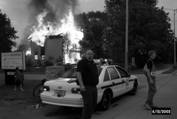|
MAYOR'S MESSAGE Dear Resident, Whether you are a life-long Resident of Mokena or you have just moved to the area, you have no doubt decided to live here for the many advantages offered by our community. The small town atmosphere, excellent schools, proximity to your place of employment, and overall quality of life make Mokena a nice place to live. Despite the advantages of living in Mokena, it would be imprudent for us to think we are immune from the effects of a disaster striking our Community. One only needs to watch the news to see that disasters of all kinds strike Communities across the United States nearly every day. If a disaster were to strike, Mokena's emergency crews would respond to preserve life and protect property. However, it is the actions that individuals and families take to prepare themselves to survive a disaster that make the difference. Knowing what to do is your best protection and your responsibility. This handbook was initially developed and circulated in 1994 to provide Mokena's residents with basic information to help in preparing before a disaster happens. Since the handbook received such favorable comments from Residents at that time, we felt an additional distribution of this modified version would be equally useful to Mokena Residents. Should you have any questions regarding ESDA please call the Village Hall at (708) 479-3900. Sincerely, Joe Werner THE MISSION OF THE MOKENA EMERGENCY SERVICES & DISASTER AGENCY Originally created during the 1950's as the Mokena Civil Defense Agency, Mokena Emergency Services & Disaster Agency (ESDA) is an all volunteer department of the Village. It is charged with spearheading the efforts of the Village in disaster prevention, preparedness, response, and recovery, and for providing a wide variety of unique and supplemental emergency services. Mokena ESDA volunteers perform a number of functions, including: * Emergency planning and preparation Perhaps you have seen ESDA personnel directing traffic at an emergency scene or providing assistance at Membership in Mokena ESDA is open to eligible individuals over age 21. If you think you might be interested in becoming a part of ESDA, give our agency a call at (708) 479-3922 EMERGENCY TELEPHONE NUMBERS In Mokena, the number to call for police, fire, or medical emergencies is:
When you call, be sure to: * Give your name, telephone number, and the location of the emergency.
Remember, 9-1-1 is for emergencies only. For non-emergency situations use the following numbers: Police: (708) 479-3911 WARNING SIRENS The Village of Mokena has installed several outdoor warning sirens throughout the Village for use during impending emergencies. They are the quickest, most effective means for helping to warn of emergency situations affecting a Mokena utilizes two different signals for emergency situations: 3 MINUTE STEADY BLAST - This is used as an attention signal, most often to warn of an approaching funnel cloud or tornado. However, it may also be used for other emergencies, such as a chemical spill. 3 MINUTE UP-AND-DOWN BLAST - In accordance with Federal guidelines, this signal is used strictly in case of a national emergency. It has no other meaning and will be used for no other purpose. To ensure that the sirens are working properly, the siren system is tested on the first Tuesday of each month at 10:00 a.m. When you hear a siren signal you should be prepared to respond immediately. The warning time given, by the sirens may provide several minutes advance warning, or only a few seconds! DO NOT CALL 9-1-1 TO FIND OUT WHY THE SIRENS ARE SOUNDING. Doing so wastes valuable time and overloads the emergency lines. Call 9-1-1 only if there is an emergency where you are. Upon hearing either of these signals, you should do the following: PROCEED TO YOUR BASEMENT OR AN INTERIOR ROOM ON THE LOWEST LEVEL OF YOUR HOME. This is your best shelter for many types of emergencies, including a tornado. TURN ON YOUR RADIO AND LISTEN FOR OFFICIAL INFORMATION. During severe storms, you can find information provided by the National Weather Service on nearly every radio station in our area. For local emergencies such as a chemical accident, Village officials will release emergency instructions and information on WJOL 1340 AM and WLLI, 96.7 FM. Listen to and follow the instructions given on the radio. There is no "All Clear" signal issued after an emergency situation. Listen to your radio to determine when it is safe to resume your regular activities. Besides sirens, there are other ways that you may receive warnings and emergency instructions. This may include cable television, telephone notification, and mobile public address. Be alert for warnings from these sources and be BEFORE DISASTER STRIKES There is much that you can do beforehand to improve your safety and comfort when a disaster strikes. 1. Create an emergency plan for you and your family. Your plan should include: * Discussing what types of disasters can happen and what to do in each case. A. Right outside your home in case of a sudden emergency, such as a fire. B. Outside your neighborhood in case you cannot return home. Showing * Posting emergency telephone numbers. Teach children how and when to call 9-1-1. 2. Assemble a disaster supplies kit, including: · A three-day supply of water (one gallon per person per day) and food that won't spoil. · A blanket or sleeping bag and one change of clothing per person. · A first aid kit including your prescription medications and an extra pair of glasses. · Emergency equipment including a battery powered radio, flashlight, spare batteries, a wrench for turning off utilities, a shovel, and work gloves. · An extra set of car keys and a credit card, cash, or traveler's checks. · Sanitation supplies. · Special items for infant, elderly, or disabled family members. · Copies of important documents and personal records., Be sure to store them in a waterproof container. 3. Prepare your home for disaster: * Conduct a "hazard hunt" to find items which may be dangerous (flammables, electrical hazards, loose objects, etc.). * Check to make sure your have proper insurance coverage. * Install smoke detectors on each level of your home-. * Make a home inventory for insurance purposes. If you have a video camera, you can even make a "video inventory" of each room. Be sure to record serial numbers where applicable. WHEN DISASTER STRIKES Whether it is a tornado, fire, accident, or chemical spill, your quick and responsible actions can make the difference DO.... DON'T.... Of all the potential disasters we face, a tornado can be the most devastating, and can strike with the least warning. TORNADO WATCH: A tornado watch means that weather conditions are favorable for the development of tornadoes. TORNADO WARNING: This means that a tornado or funnel cloud has been sighted or detected by radar in the area. A tornado warning may also be accompanied by the sounding of the warning sirens. These are your signals to seek What is your best shelter? Whether at home, work, or school, your best available shelter is in a basement under a sturdy piece of furniture, like a table. If no basement is available, then go to a small interior room on the lowest floor. If you are outside, seek shelter indoors if time permits. I not, go to a ditch or culvert and lie down. Watch for flash flooding! Do not seek shelter under trees, which may be struck by lightning. If you are in a car, abandon it immediately and seek better shelter. Tornadoes have been clocked at forward speeds of 70 miles per hour, so don't try to outrun it! RECOVERING FROM DISASTER If you are the victim of a disaster, you will find it important for you and your family to begin the process of recovery as soon as possible: * Board up broken windows and holes in the walls or roof. * Clean and dry furniture and carpeting as soon as possible. * Notify your insurance agent. Follow your agent's directions for filing a claim. * Don't be rushed into signing repair contracts. Be sure you deal only with reputable contractors. * Keep all receipts for living expenses, temporary repair costs, and clean-up costs so you can seek insurance reimbursements. In some cases, individual recovery assistance may be made available from the State or Federal governments, as well as a number of private relief organizations. In addition, there will be many questions that you may have. Village officials will provide additional information to address your concerns during the recovery period. Information may be disseminated through radio, television, newspapers, and printed notices. One or more disaster assistance centers may also be established to help make it easier to obtain information and help. FOR ADDITIONAL INFORMATION If you would like more information about what to do before during, Village of Mokena For additional information on fire safety, contact your appropriate fire protection district: Mokena Fire Protection District Frankfort Fire Protection New Lenox Fire Protection District |


|
Mokena Emergency Services & Disaster Agency |




Disaster Handbook (Published 1994) (Edited 2007) |
November 5, 2009 |